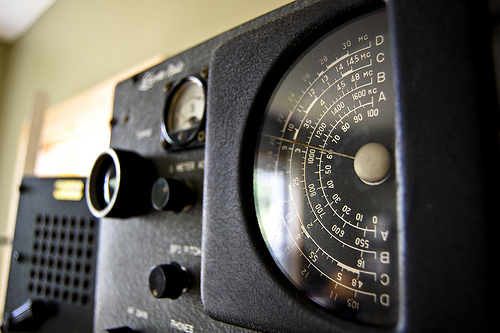Got change? Want change? Spare some and get some by becoming a member of rabble.ca today.
Across the Indian sub-continent and Asia, shortwave radio sets scan up and down familiar frequencies, seeking a signal from Canada that had come to be known as “an old friend.” Internet-blocked Chinese activists search the dial for Canadian news of a Hong Kong demonstration. But an ocean of low static is all that emanates from the Sackville, New Brunswick transmitter. Canada’s once robust international radio voice has fallen silent, victim of the latest round of budget cuts.
Recently, choked with emotion, Mark Montgomery closed out the final transmission of Radio Canada International (RCI) after 67 years of shortwave radio programming to the world. Then, dead air. Radio station shuttered and budget slashed by 80 per cent, RCI is now reduced to an anemic web presence and a skeleton staff.
Like vinyl records, newspapers and incandescent light, the death of shortwave radio has long been heralded. But the global millions who listened regularity to RCI may disagree. So do I.
As a nearly blind child, my world was pretty small. But once I found shortwave radio, the world bloomed out of my orange foam headset. My dad slung a long wire up over a high branch in a neighbour’s tree. That antenna connected me to something bigger; fracturing the lonely alienation of the 1980s.
I pulled down signals from the other side of the world, hearing Latin American politics, Eastern bloc propaganda, and the Voice of America, warning, in “simple English” of communism in our back yard. I heard critiques of Reaganomics and learned about the Squamish Five via the Australian Broadcasting Corporation, despite the Five living in the same city as me.
Shortwave is how the last terrible moments of the Hungarian uprising of 1956 were communicated to the world, revolutionaries pleading for help over the airwaves, then iron curtain static as the radio station was overrun by Stalin’s tanks. Radio has been an important part of every social movement in the 20th century. In the 1980s, El Salvador’s underground Radio Venceremos sometimes used the barbed wire of cattle fences to transmit signals.
Unlike the Internet, which is easily disrupted by dictators, hackers, wars or natural disasters, shortwave cannot really be jammed and does not require the massive infrastructure of fiber optic networks, servers and miles of phone or cable lines. Unlike reading this story on-line, listening to radio does not leave an electronic record. A profile of one’s interests cannot be generated by authorities. Though, Canadians surely would never have cause to worry about this.
I am not a cyber-luddite. Podcasting has given birth to a radio renaissance and an explosion of voices. Just listen to Memory Palace, 99% invisible or Transom to see how the format is being innovated. Yet, I would never want to see Vancouver’s Co-op Radio or CBC Radio One reduced to an on-line only presence. I want to live in a broad community, not a pod of one.
Radio waves easily cross the digital divide. About a third of the world has no access to phones or electricity, never mind Internet. But battery-powered and hand-cranked shortwave radios are ubiquitous over the developing world, and they won’t be hearing from Canada any more.
Shortwave is also a good backup when other forms of communication go down. It can be used to communicate internally in case of natural disasters (this was done during Hurricane Katrina) and can even transmit Internet content.
Starting at the end of World War II and eventually in 16 languages, RCI bounced radio waves off the ionosphere and down to millions of listening ears. The service was beamed into the eastern bloc during the Cold War. People tuned in under authoritarian states and in overseas markets in Asia, the Middle East, Eastern Europe and Africa. Signals outmaneuvered government censors that now only need a couple of keystrokes to block information.
I am not suggesting that RCI is a radical voice. It is no rabble or Media Coop. But neither was the service a mouthpiece for the Canadian government. It did have to “consult” periodically with the Department of Foreign Affairs and International Trade about where to broadcast, but had editorial freedom, regularly covering social movements, strikes and Indigenous issues.
Of 18 western countries, Canada is 16th in terms of expenditure per capita on public broadcasting, narrowly beating out New Zealand and the U.S., but RCI punched above its weight.
“Please, Canada, find a way to avoid severing your own tongue. The world is listening to you,” pleads U.S. citizen and founding director of U.S. NGO Ears to Our World, Thomas Witherspoon.
In the ’80s, 20 million Chinese listeners learned English from a series of RCI broadcasts running for months in advance of regular programming to the Middle Kingdom. But China is now more a market for Canadian petro-exports than radio.
Last weekend, Hong Kong erupted in pro-democracy protests. But on the Chinese mainland, the state was able to censor most reportage by blocking Internet content, through deep packet analysis, or simply by a flood of propaganda from government bloggers and tweeters. Previously, millions tuned into RCI’s “Voice of Canada” and would have heard such news. But RCI’s web-site is blocked in China.
International shortwave radio is old school for sure. At fractions of a cent per listener, it’s also cheap and accessible. It allows activists overseas to hear what their own governments are up to. Radio is part of the global conversation. The RCI Action Committee is an employee effort with union support campaigning to save the service.
Radio silence is a ham-fisted decision.
End of transmission.
Garth Mullins is a writer, long time social justice activist and three-chord propagandist living in East Vancouver. You can follow him @garthmullins on Twitter.




